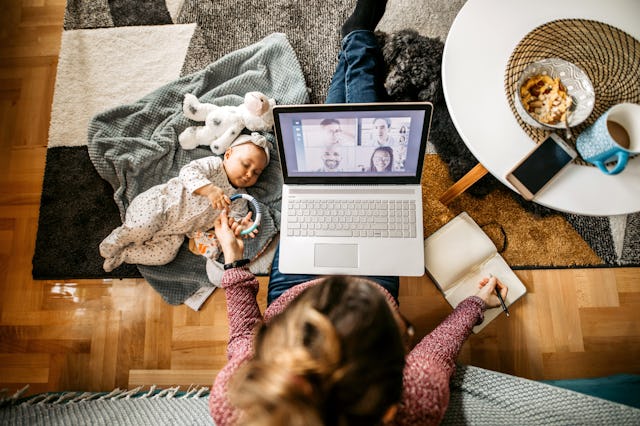If COVID Has Taught Us Anything, It's That It Takes Way More Than The Modern 'Village'

Everyone’s heard the adage, “It takes a village,” in respect to parenting. And thousands of years ago, people did actually have the help of a village in raising their children. Everyone shared chores, and goals were reached as a collective effort, including raising all the children. This ensured a maximum survival rate because let’s face it, sometimes just surviving is incredibly hard, and no one can do it all on their own.
Yet, today’s modern parent is expected to virtually do just that. We now live yards (if not acres) away from each other in homes that contain only our immediate nuclear families and a lot of tchotchkes. We don’t have our closest girlfriends and elders, all living within a ten foot radius of us to help with our burden. Some of us are with our children, with no other real adult interaction, for hours (or even days) on end. We can seek relationships on the internet, but when relative anonymity is an option, it’s pretty much scientifically proven that there is a huge increase in general nastiness. Thus, there tends to be very little communal attributes to today’s living.
Add in a worldwide pandemic, and it was only natural for us to fully realize how inefficient and isolating today’s “village” is. It may have taken quarantine, nearly two years of increased isolation, hundreds of thousands of deaths, but it is absolutely undeniable: the modern parent is not supported enough.
According to Mental Health America, the number of American adults who have serious suicidal thoughts has risen four percent since 2020. Additionally, over one million more American adults were diagnosed with a mental illness in the last year, bringing the total to over 47 million American adults; about 19% of the U.S.’s adult population. However, the American Hospital Association has since reported findings that state a whopping seventy percent of both American parents and those who are adult caregivers have experienced at least one severe mental health symptom. Up to fifty percent of parents and caregivers have idealized suicide, which makes them eight times more likely to do so than non-parents.
As if our reports of being overwhelmed between work, childcare, and avoiding falling ill in a pandemic wasn’t enough, the statistics are screaming: parents and guardians are drowning. We are in desperate need of a mental health system that actually offers support and concrete resources. We also need established, affordable childcare options. We don’t only need to know we aren’t alone in the difficulty and our grief, we need support. Stat.
This article was originally published on